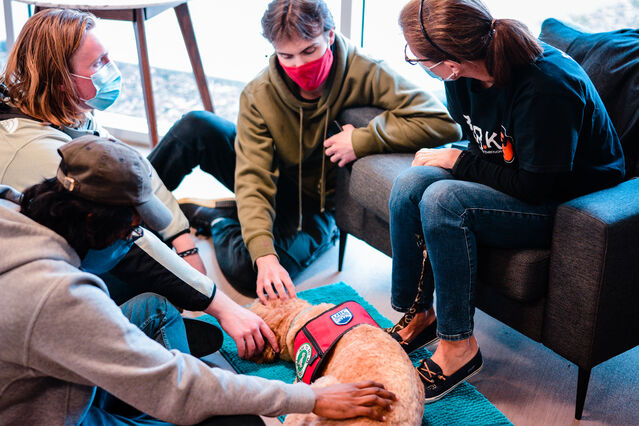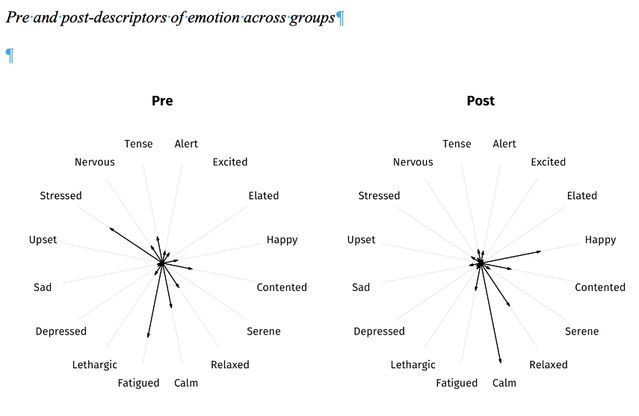Stress
Therapy Dogs Provide Virtual Comfort
Virtual canine comfort modules reduce student stress and bolster well-being.
Posted April 30, 2022 Reviewed by Vanessa Lancaster
Key points
- Researchers recently investigated the effects of spending time virtually with therapy dogs.
- The new study suggested that therapy dogs can help reduce stress and improve well-being within a virtual context.
- The researchers found that pending time virtually with therapy dogs and handlers improves students' positive affect.

For dog lovers with a penchant for science, I have a job many would move mountains to have. This is not lost on me, and I’m fortunate to leave the office many days covered in dog hair.
I am the founder and director of a large canine therapy stress-reduction program at the University of British Columbia, Okanagan campus.
Titled “B.A.R.K.” (Building Academic Retention through K9s), we’re celebrating our tenth year on campus and routinely see upwards of 4,000 students make use of our programs each year.
It wouldn’t be an exaggeration to say that the B.A.R.K. program has changed the fabric and landscape of our campus – there are red-vested therapy dogs found about the campus several days each week, and our students have come to recognize them as a source of social and emotional support. In short, the B.A.R.K. dogs help students reduce their stress and homesickness and help connect students.

Like other researchers worldwide, our research in B.A.R.K. had to pivot due to Covid-19, and we were forced to consider alternative research avenues that didn’t rely on in-person sessions. Ever nimble, however, and thanks to a collaboration with researcher Christine Tardif-Williams and her team from Brock University, we were able to transform our in-person delivery model into a virtual format.
Always chasing evidence to see how well interventions work, we assessed the impact on students’ well-being. This discussion aims to share our process and findings (see new Anthrozoos publication here).
We began by creating virtual canine comfort modules that involved having several volunteer dog handlers participate in filmed sessions – either via Zoom or Youtube. Scripted to ensure consistency across conditions, the handlers welcomed students and asked open-ended probes to encourage students to reflect on their stress levels and overall well-being.
We aimed to approximate a typical interaction that would take place during an in-person visit to the B.A.R.K. stress-reduction drop-in program. We then randomly assigned 467 undergraduate students to live Zoom sessions with a dog-handler team or just a handler with no dog present (to tease out the effects of the therapy dog). Zoom or Youtube sessions were restricted to five minutes.
Participants completed a series of pre-and post-test measures that included self-reports of stress, anxiety, loneliness, positive and negative affect, etc.).
Key Findings
- Students reported significant boosts to their well-being regardless of their assigned condition. Whether they spent time with a dog-handler team or just a handler, and whether that was via Zoom or a pre-recorded YouTube video, students left sessions feeling less stressed, lonely, and anxious and with a stronger sense of connectedness to campus.
This overall shift in emotion as experienced by all participants regardless of the condition to which they were assigned is captured in the Circumplex Model of Affect findings. Participants were asked to select a term that reflected how they felt in the moment – before the intervention and immediately afterward.
- Only students who participated in a live Zoom session where both a dog and a handler were present experienced significant pre-to-post gains in positive affect (i.e., feeling enthusiastic, excited, inspired, etc.).

Our study was the first randomized controlled trial to empirically investigate the effects of spending time virtually with therapy dogs and offers a model for others curious to remotely support students' well-being. It holds the potential to support students who are “hard to reach,” those whose colleges don’t offer in-person canine-assisted stress-reduction sessions, and those students, who, because of Covid-19 or a variety of other reasons, find themselves learning within a virtual context.
Virtual Canine Comfort Modules
Our virtual canine comfort modules are available to the public, and, to date, participants from 33 countries have accessed the modules. Educators at all levels might consider providing their students access to these modules to allow them to destress as part of their class, akin to a brain break or mindful moment.
References
Binfet, J.T., Tardif-Williams, C., Draper, Z. A., & Green, F. L. L., Singal, A., Rousseau, C. X., & Roma, R. (in press). Virtual canine comfort: A randomized controlled trial of the effects of a canine-assisted intervention supporting undergraduate wellbeing. Anthrozoos.


